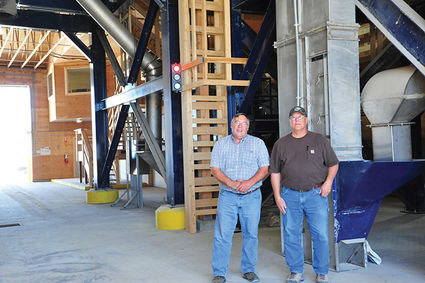BIG HORN BASIN EDITION: Big Horn Co-op opening state-of-art fertilizer plant
WORLAND - Big Horn Cooperative Marketing Association will be opening up a state-of-the-art fertilizer plant in Basin this fall.
June 22, 2018

Karla Pomeroy
Big Horn Co-op general manager Mike Hanser and plant manager Chuck Schlagel stand in the loading area that is complete with stop lights to make sure trucks stop at the right spot to get loaded with fertilizer at the new plant in Basin.
WORLAND - Big Horn Cooperative Marketing Association will be opening up a state-of-the-art fertilizer plant in Basin this fall.
Big Horn Co-op General Manager Mike Hanser said the plant is a "vision of the board of directors to help serve agriculture in the region and feed the world."
In an interview last week, Hanser said the plant is "mostly complete" with work continuing on a storm water drainage system. He said they have received a few loads of product but the plant will not be fully operational until this fall.
The new plant, located at 400 W Street in Basin, replaces the old fertilizer plant at the same location. The overall vision for the new plant started about five to six years ago, Hanser said.
Hanser said the new plant is just over a 12,000-ton plant with about 250-ton per hour capacity for receiving, and blending and outgo.
The new plant is the first plant built by Big Horn Co-op since the early 1970s. He said plants were built around that time in Powell, Riverton and Basin.
In order to construct the new plant they had to remove the old railroad spur. He said they wanted it to be on the mainline of the rail service so they had to purchase property from the railroad.
The actual work on the new plant began in April 2017 with the removal of the old rail site and the demolition of the old plant. Upon the demolition of the old plant the Worland Big Horn Co-op plant has been serving the Basin area customers.
The new plant, designed for storing and blending of crop nutrients, has 15 bins to store main crop nutrients and seven bins for micronutrients.
The new plant, in addition to having much larger capacity, is much more technologically advanced. "It's a difference of night and day in technology," Hanser said.
Hanser said the plant can receive nutrient product by rail or truck. The product is stored into the bins until ready to be blended. The blending part of the system is fully automated and is run by computer. The computer operator signals the employee on the loader which blender bins need to be filled. The nutrients are loaded into the bins. The computer operator programs in the recipe for the blend, each product is weighed and then dumped into the blender.
Plant manager Chuck Schlagel said the blender can blend in 30 seconds, where the old blender took several minutes.
Hanser said the blender, from A. J. Sackett is the most state-of-the-art blending system available. He said the design concept is not much different than a kitchen blender, just much larger in scale.
With the new technology in the blender system that includes the weighing of the product, it is more accurate than the old system, which will provide a better blend for farmers and ranchers, Hanser said.
The old blender, however, will be used in the new plant as the seed mixer, he noted.
Schlagel said loading the blended product into trucks is much faster as well.
With all the technology running the new plant, Schlagel said there is an electrical room that is climate controlled and fireproof.
The overall project, with new rail spur, construction and equipment cost $8.5 million, Hanser said. Contractor for the plant is Stave Construction out of Iowa, which specializes in fertilizer plants.
With the opening of the new plant this fall, Hanser said Big Horn Co-op will be closing the Worland fertilizer plant. The Basin plant is the first of its kind in the area, Hanser said.
BIG HORN CO-OP
Big Horn Co-op began in 1923 in Basin as a turkey marketing co-op. Hanser said they raised turkeys, slaughtered them and sent them on the rail.
A year ago, during demolition of the old plant, in one of the old sheds they found turkey feathers and an old refrigerator rail car from that era.
Hanser said they have old articles that state the co-op could process 600 birds in a day.
Today, Big Horn Co-op has a presence in Powell, Byron (an unmanned fueling station only), Greybull, Basin, Worland, Riverton and Buffalo. There are fertilizer plants in Powell, Basin, Worland, Riverton and Buffalo.
There are propane stations at Riverton, Buffalo and Worland. There are tire shops at Powell, Greybull and Worland.
All locations except Byron have retail stores.
Big Horn Co-op currently has between 3,500 to 4,000 members.


